英语介词in、on、at等的用法大全
地点介词in on at用法
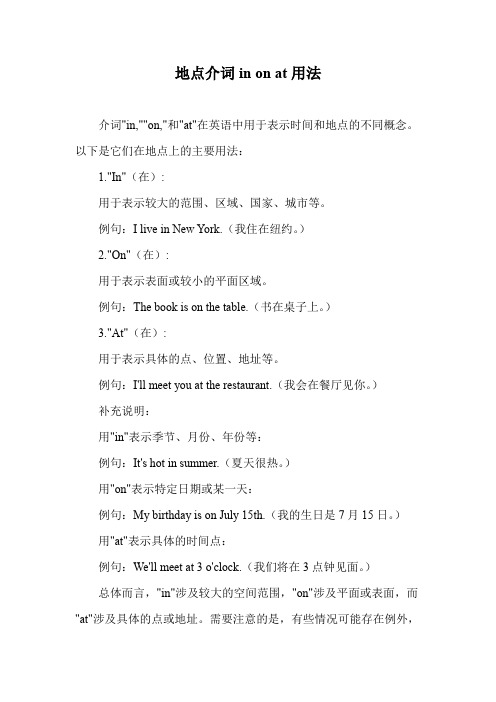
地点介词in on at用法
介词"in,""on,"和"at"在英语中用于表示时间和地点的不同概念。
以下是它们在地点上的主要用法:
1."In"(在):
用于表示较大的范围、区域、国家、城市等。
例句:I live in New York.(我住在纽约。
)
2."On"(在):
用于表示表面或较小的平面区域。
例句:The book is on the table.(书在桌子上。
)
3."At"(在):
用于表示具体的点、位置、地址等。
例句:I'll meet you at the restaurant.(我会在餐厅见你。
)
补充说明:
用"in"表示季节、月份、年份等:
例句:It's hot in summer.(夏天很热。
)
用"on"表示特定日期或某一天:
例句:My birthday is on July 15th.(我的生日是7月15日。
)
用"at"表示具体的时间点:
例句:We'll meet at 3 o'clock.(我们将在3点钟见面。
)
总体而言,"in"涉及较大的空间范围,"on"涉及平面或表面,而"at"涉及具体的点或地址。
需要注意的是,有些情况可能存在例外,
因此在具体语境中仍需谨慎使用。
全面、清晰的in、on、at的时间用法和地点用法
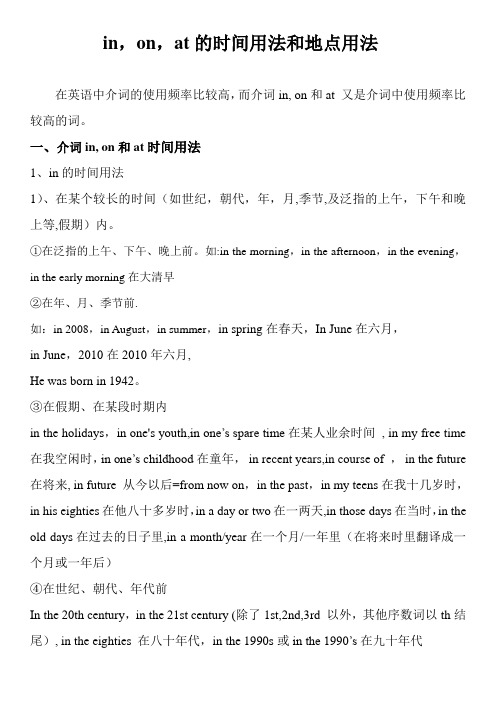
in,on,at的时间用法和地点用法在英语中介词的使用频率比较高,而介词in, on和at 又是介词中使用频率比较高的词。
一、介词in, on和at时间用法1、in的时间用法1)、在某个较长的时间(如世纪,朝代,年,月,季节,及泛指的上午,下午和晚上等,假期)内。
①在泛指的上午、下午、晚上前。
如:in the morning,in the afternoon,in the evening,in the early morning在大清早②在年、月、季节前.如:in 2008,in August,in summer,in spring在春天,In June在六月,in June,2010在2010年六月,He was born in 1942。
③在假期、在某段时期内in the holidays,in one's youth,in one’s spare time在某人业余时间, in my free time 在我空闲时,in one’s childhood在童年,in recent years,in course of ,in the future 在将来, in future 从今以后=from now on,in the past,in my teens在我十几岁时,in his eighties在他八十多岁时,in a day or two在一两天,in those days在当时,in the old days在过去的日子里,in a month/year在一个月/一年里(在将来时里翻译成一个月或一年后)④在世纪、朝代、年代前In the 20th century,in the 21st century (除了1st,2nd,3rd 以外,其他序数词以th结尾), in the eighties 在八十年代,in the 1990s或in the 1990’s在九十年代2)、在一段时间in a month/year在一个月/年里(在将来时里翻译成一个月/年之后)in the day(time)在白天,可换成duringin my childhood在我的童年里in my free/leisure time在我空闲时,in可换成during,也可以写成at leisure在空闲时。
at和on和in的用法及区别
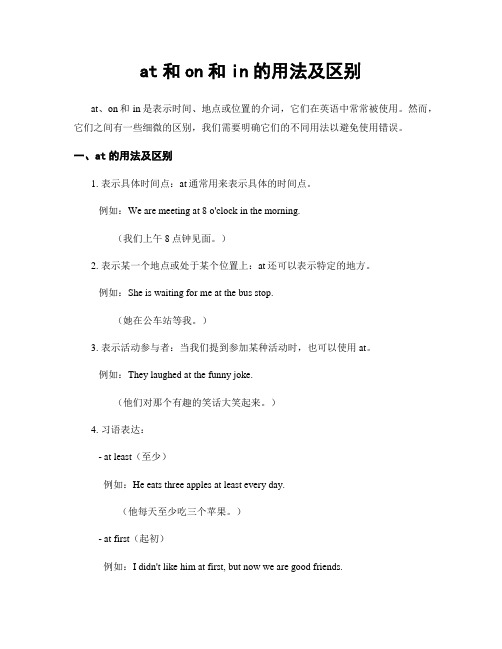
at和on和in的用法及区别at、on和in是表示时间、地点或位置的介词,它们在英语中常常被使用。
然而,它们之间有一些细微的区别,我们需要明确它们的不同用法以避免使用错误。
一、at的用法及区别1. 表示具体时间点:at通常用来表示具体的时间点。
例如:We are meeting at 8 o'clock in the morning.(我们上午8点钟见面。
)2. 表示某一个地点或处于某个位置上:at还可以表示特定的地方。
例如:She is waiting for me at the bus stop.(她在公车站等我。
)3. 表示活动参与者:当我们提到参加某种活动时,也可以使用at。
例如:They laughed at the funny joke.(他们对那个有趣的笑话大笑起来。
)4. 习语表达:- at least(至少)例如:He eats three apples at least every day.(他每天至少吃三个苹果。
)- at first(起初)例如:I didn't like him at first, but now we are good friends.(我起初不喜欢他,但现在我们是好朋友了。
)二、on的用法及区别1. 表示具体日期或星期几:on通常用来表示具体的日期或星期几。
例如:Your birthday is on December 21st.(你的生日是12月21日。
)2. 表示具体的特定天:当提到某一天时,我们常常使用on。
例如:I will see you on Monday.(星期一我会见你。
)3. 表示某种媒介或平台:on还可以表示媒介或平台。
例如:I read the news on the internet.(我在网上阅读新闻。
)4. 表示参加节庆、活动等特殊场合:当我们参加特殊的节庆、活动时,也使用on。
例如:We celebrate Christmas on December 25th.(我们在12月25日庆祝圣诞节。
in、on、at用法

in on at 区别用法妙计口诀1.早、午、晚要用in,at黎明、午夜、点与分。
年、月、年月、季节、周,阳光、灯、影、衣、帽用in。
将来时态in...以后,小处at大处in。
有形with无形by,语言、单位、材料in。
特征、方面与方式,心情成语惯用in。
介词at和to表方向,攻击、位置、恶、善分。
2.日子、日期、年月日,星期加上早、午、晚,收音、农场、值日on,关于、基础、靠、著论。
着、罢、出售、偷、公、假,故意、支付、相反,准。
特定时日和“一……就”,on后常接动名词。
年、月、日加早、午、晚,of之前on代in。
步行、驴、马、玩笑on,cab,carriage则用in。
at山脚、门口、在当前,速、温、日落、价、核心。
如大体掌握上面介词用法口诀,就不易出错。
下面对该口诀分别举例帮助你理解消化。
<1.>关于时间早、午、晚要用inin the evening 在晚上in the day 在白天例: in the afternoon 在下午in the morning 在早上at黎明、午、夜、点与分例 at dawn /at daybreak 在黎明时候at night 在夜间at noon 在中午at midnight 在午夜(以上短语都不用冠词)at nine o'clock 在9点钟at half past ten 在10点半at ten thirty . 在上午10点30分at the weekend 在周末at a quarter to two 1点45分<2.>关于年、月、年月、季节、周即在“来年”,在“某月”,在“某年某月” 但在某年某月某日则用on ,在四季,在第几周等都要用in。
in 1927 在1927年in March 在三月in December 1986 在1986年12月in July l984 在1984年7月in the first week of this semester这学期的第一周in the third week 在第三周in spring 在春季<3.>关于日子、日期、年月日,星期加上早午晚以下皆用onon October the first 1949 1949年10月1日on May the first 5月1日on the sixteenth 16号on the second of January /on January the second 1月2日on a summer evening 在夏天的一个夜晚on New Year's Day 在元旦on my birthday 在我的生日on winter day 在冬天on December 12th 1950 l950年12月12日on Sunday 在星期天on Tuesday morning 星期二早晨但last night 昨夜;in the evening 在晚上 on time准时,in time及时,等则不同。
in on和at 的用法
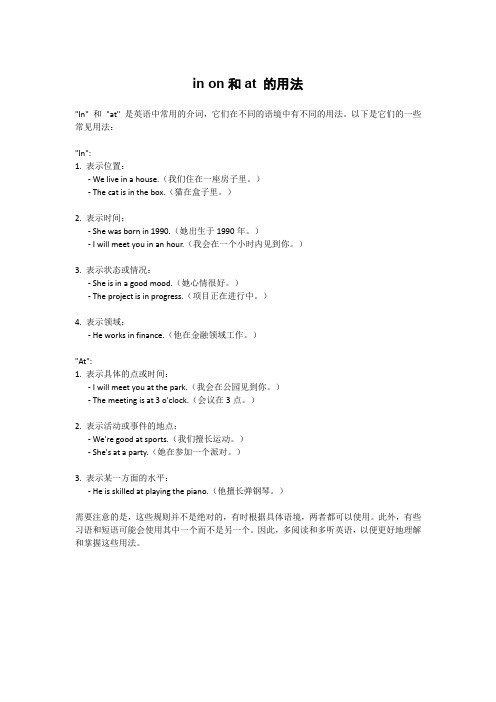
in on和at 的用法"In" 和"at" 是英语中常用的介词,它们在不同的语境中有不同的用法。
以下是它们的一些常见用法:"In":1. 表示位置:- We live in a house.(我们住在一座房子里。
)- The cat is in the box.(猫在盒子里。
)2. 表示时间:- She was born in 1990.(她出生于1990年。
)- I will meet you in an hour.(我会在一个小时内见到你。
)3. 表示状态或情况:- She is in a good mood.(她心情很好。
)- The project is in progress.(项目正在进行中。
)4. 表示领域:- He works in finance.(他在金融领域工作。
)"At":1. 表示具体的点或时间:- I will meet you at the park.(我会在公园见到你。
)- The meeting is at 3 o'clock.(会议在3点。
)2. 表示活动或事件的地点:- We're good at sports.(我们擅长运动。
)- She's at a party.(她在参加一个派对。
)3. 表示某一方面的水平:- He is skilled at playing the piano.(他擅长弹钢琴。
)需要注意的是,这些规则并不是绝对的,有时根据具体语境,两者都可以使用。
此外,有些习语和短语可能会使用其中一个而不是另一个。
因此,多阅读和多听英语,以便更好地理解和掌握这些用法。
介词的用法in on at
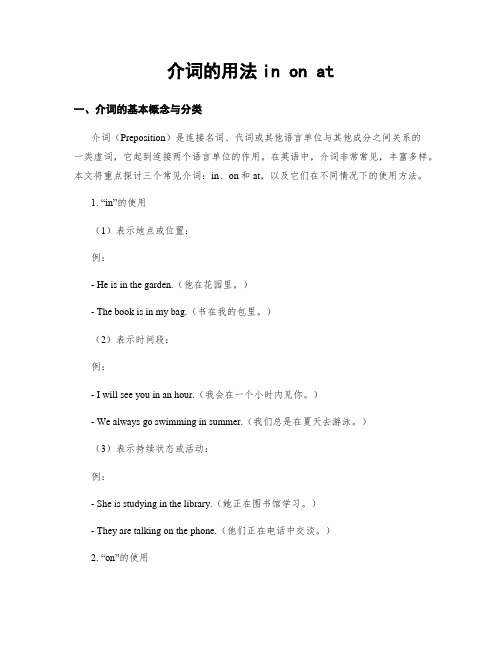
介词的用法in on at一、介词的基本概念与分类介词(Preposition)是连接名词、代词或其他语言单位与其他成分之间关系的一类虚词,它起到连接两个语言单位的作用。
在英语中,介词非常常见,丰富多样。
本文将重点探讨三个常见介词:in、on和at,以及它们在不同情况下的使用方法。
1. “in”的使用(1)表示地点或位置:例:- He is in the garden.(他在花园里。
)- The book is in my bag.(书在我的包里。
)(2)表示时间段:例:- I will see you in an hour.(我会在一个小时内见你。
)- We always go swimming in summer.(我们总是在夏天去游泳。
)(3)表示持续状态或活动:例:- She is studying in the library.(她正在图书馆学习。
)- They are talking on the phone.(他们正在电话中交谈。
)2. “on”的使用(1)表示表面或位置:例:- The cup is on the table.(杯子放在桌子上。
)- She sat on the chair. (她坐在椅子上。
)(2)表示日期或特定日子:例:- We have a party on Saturday night. (我们星期六晚上要参加一个聚会。
)- Christmas falls on December 25th.(圣诞节在12月25日。
)(3)表示接触或联系:例:- Please write your name on the paper. (请把你的名字写在这张纸上。
)- I will call you on the phone. (我会打电话给你。
)3. “at”的使用(1)表示具体时间点或某个事件:例:- The meeting starts at 9 o'clock.(会议九点钟开始。
介词on,in,at的用法及例句
介词on,in,at的用法及例句表示时间、地点的介词,最常用的是on、in、at,这三个介词,on、in、at这三个常用介词都可以表示时间和地点:on 具体指某一天,包括当天。
in泛指但不具体,范围比较大。
at指表示一个时间点。
介词on,in,at的用法及例句1on的用法1、表示时间“在(某一天,某天早上,某天前夕等)”。
on Monday 在星期一on October 1 在十月一日on Sunday morning 在星期日早晨on New Year's Eve 在除夕on the morning of May 1 在五月一日的早晨He went home on Monday last week.他在上星期一回家了。
2、表示位置“在...上”(与物体接触)There is a map of world on the wall.墙上有一幅世界地图3、表示“关于”(表示关系)。
We will have a talk on the history of the Party this afternoon.今天下午我们有关于党史的报告。
What about your idea on the subject?关于这个问题你有什么看法?4、引申意义,表示“从事...”“处于...情况中”。
They are on holiday.他们在度假。
2in的用法1、表示时间(年、月、季节、早晨、下午、晚间等) in 1976 在1976年in October 在十月in spring 在春天in the morning/afternoon/evening 在早上/下午/晚上I will come in a week.我一周后回来。
2、表示地点、场所。
The bullet wounded me in the leg.子弹打伤了我的腿。
3、表示“穿着、戴着(衣服、帽子等)”。
The girl in red is Li Ming's sister.穿红衣服的女孩是李明的妹妹。
快速掌握地点介词In、on、at的方法
快速掌握地点介词In、on、at的方法快速掌握地点介词 In、On、At 的方法在英语中,地点介词是用来描述事物或人所在位置关系的词汇。
本文将为您详细介绍如何快速掌握这三个常用的地点介词:in、on、at。
一、介词 In 的用法1. 表示在某个范围内- I live in Beijing. (我住在北京。
)- There is a book in the bag. (书包里有一本书。
)2. 表示在某物体内部- There is water in the bottle. (瓶子里有水。
)- She is in the room. (她在房间里。
)二、介词 On 的用法1. 表示在某物体的表面上- There is a book on the table. (桌子上有一本书。
)- He put the cake on the plate. (他把蛋糕放在盘子上。
)2. 表示在某物体上部- There is a cat on the roof. (屋顶上有一只猫。
)三、介词 At 的用法1. 表示在某个特定点上- I will meet you at the airport. (我在机场等你。
)- She lives at No. 10 Downing Street. (她住在唐宁街10号。
)2. 表示时间点- I will call you at 8 o'clock. (我在8点给你打电话。
)总结通过以上详细解析,我们可以总结出:- In用于表示在某范围内或某物体内部。
- On用于表示在某物体的表面或上部。
- At用于表示某个特定点或时间点。
希望这份文档能帮助您快速掌握这三个地点介词的用法。
在日常英语交流中,灵活运用这些介词,能够更准确地描述事物或人的位置关系。
介词on、in、at-的用法.
1)in 把地方、地点、位置当作一个范围或一个封闭的空间:1.I live in Beijing. 我住在北京。
(大城市用in)2.I live in England, at London. 我住在英国伦敦。
(England大过London喔)3.I live in a big city, my brother lives at a small town. 我住在大城市,我哥哥住在一个小市镇。
(如果把city看做一个圆圈,small town就成一个点。
因此就ina city, at a small town. 呵呵)4.We have a meeting in Beijing. 我们有北京有一个会议。
5.Mars is in the Solar System. 火星在太阳系里。
6.in a car 乘汽车(不是on a car 也不是by a car 喔)7.in a taxi 乘的士(不是on a taxi 或by a taxi )8.in a helicopter 乘直升机9.in a boat 乘小船10.in a lift (elevator) 乘电梯(电梯像个笼子,当然要用in 啦)11.in the newspaper 在报上12.in the sky 在空中13.in the bed 在床上(也可用on the bed)14.in the bedroom/ class/ library/ school 在寝室/课室/图书馆/学校.2).at 把地方、地点、位置当作一个“点”:1.The begger is sitting at the corner. 那乞丐坐在角落里。
2.Jane is waiting for you at the bus stop. Jane在巴士站等你。
3.at home 在家4.Who's standing there at the door? 谁站在门口?5.at the top of the page 在一页的上面6.The shop is at the end of the road. 那商店就在路的尾端。
英语介词干货:at、on、in的用法总结
英语介词干货:at、on、in的用法总结at,on和in是表示时间的常用介词,各类考试屡见踪影,也是孩子容易出错的考点。
家长在辅导孩子时,用好这三个时间介词,可以先抓住一个大的原则,即at某时刻,on某天,in某段时间,时间的跨度是由小到大。
一、选用介词at的场合介词at主要可用于以下几种场合,家长需提醒孩子特别注意的是at在固定短语或习惯搭配中的使用。
(1)用于钟点前。
如:·at ten o’clock·at a quarter to six(2)用于时刻前。
如:·at noon/night/midnight(半夜)·at sunrise(日出时)·at dusk(黄昏)·at dawn/daybreak(黎明)eg:We will leave at daybreak.我们将在黎明时动身。
(3)用于表示进餐时间。
如:·at breakfast/lunch/supper(在早餐时/午餐时/晚餐时)eg:He drinks tea at breakfast.他在早餐时饮茶。
(4)用于表示年龄时。
如:·at 14(=at the age of 14在14岁)eg:He left home at the age of 16.他十六岁离开了家。
(5)用于一些固定短语或习惯搭配中。
如:·at Christmas·at New Year·at Thanksgiving(感恩节)·at the beginning/end of last month·at the moment/at that time·at this time of day·at a bad time of year·at first(起初)·at last(终于)二、选用介词on的场合(1)用于星期、日期(包括该天的各部分)前。
- 1、下载文档前请自行甄别文档内容的完整性,平台不提供额外的编辑、内容补充、找答案等附加服务。
- 2、"仅部分预览"的文档,不可在线预览部分如存在完整性等问题,可反馈申请退款(可完整预览的文档不适用该条件!)。
- 3、如文档侵犯您的权益,请联系客服反馈,我们会尽快为您处理(人工客服工作时间:9:00-18:30)。
英语介词in、on、at等的用法大全“表时间的介词at、on、in到底怎么用?”,今天接着跟大家分享这三个介词表时间的用法。
一、at1、表示时刻,即几点几分(with particular points on the clock)I’ll see you at five o’clock. (我五点和你见面。
)2、表示一天中的某个时间段(with particular points in the day)The helicopter took off at midday and headed for the island. (直升机中午起飞,飞往那个岛屿。
)3、表示一周中的某个时间段,即工作日(weekday)和周末(weekend)(with particular points in the week)What are you doing at the weekend?4、表示某种特殊场合,如名字中不含day的节假日(with special celebrations)At the New Year, millions of people travel home to be with their families(到了新年,成百上千万的人会回到家里和家人团聚。
)例外情况:如果是说在生日那天,不用at,而用on,因为生日那天是指具体日期,请往下参考on 的用法。
【注意】如果是用what time来提问,what time前面一般不用at。
如:What time are you leaving? (你几点走?)但是在口语中也可以这么问:At what time are you leaving?二、on1、用在日期前(with dates)We moved into this house on 2 October 1997. (我们是1997年10月2日搬进这栋房子的。
)2、用在星期的单数前(with a singular day of the week to refer to one occasion)I’ve got to go to London on Friday. (我周五就到伦敦了。
)3、用在星期的复数前(with a plural day of the week to refer to repeated events)The office is closed on Fridays. (办公室周五是关门的。
)特殊情况:口语中有时会省略on,如:Do you work Saturdays? (你周六上班的吗?)4、用在特殊日子前(with special dates)What do you normally do on your birthday? (你生日那天一般都做些什么?)三、in1、用在一天中的某个时间段前,一般为固定用法(with parts of the day)I’ll come and see you in the morning for a cup of coffee. (我上午来看你,一起喝杯咖啡。
)2、用在月份前(with months)We usually go camping in July or August. (我们常在7月或8月份去露营。
)3、用在年份前(with years)The house was built in 1835. (这座房子是1835年造好的。
)4、用在季节前(with seasons)The garden is wonderful in the spring when all the flowers come out. (春天里,当所有的花儿都开放时,花园很漂亮。
)5、用在较长的时间段前(with long periods of time)The population of Europe doubled in the nineteenth century. (十九世纪时期,欧洲人口翻了一倍。
)6、用在一段时间前面(to say how long it takes someone to do something)He was such a clever musician. He could learn a song in about five minutes. (他是个很聪明的音乐家,他可以在约5分钟内学会一首歌。
)7、用在“in+一段时间+'s+time”结构中,表示将来时间,如in a year’s time和in two months’time(with -'s construction to say when something will happen)I won’t say goodbye because we’ll be seeing each other again in three days’time. (我不跟你告别了,因为三天后我们就会再见面的。
)【注意】上面这句话中的in three days' time 也可以用in three days。
注意对比下面这个句子:He ran the marathon in six hours and 20 minutes. (他在马拉松比赛中用时6个小时20分钟。
)四、特殊情况1、at or on?当笼统指代假期或周末时,用at;当特指某个具体的假期或周末时,用on。
如:We never go away at the New Year because the traffic is awful. (新年我们从不出门,因为路上太堵了。
)On New Year’s Day, the whole family gets together. (在元旦那天,整个家人会团聚在一起。
)I’ll go and see my mother at the weekend if the weather’s okay. (周末如果天气好,我会去看望我母亲。
)The folk festival is always held on the last weekend in July. (这个民间节日总是在7月的最后一个周末举行。
)注意:美语里用的更多的是:on the weekend。
2、in or on?当要表示笼统表示一天中的时间段morning、afternoon、evening和night时,一般用in,而且后面要加定冠词the;当表示具体某个时间段时,要用on。
如:I always work best in the morning. I often get tired in the afternoon. (我上午的工作效率总是最好的,下午经常觉得疲倦。
)The ship left the harbour on the morning of the ninth of November. (轮船在11月9日的早上离开了港口。
)In the evening they used to sit outside and watch the sun going down. (他们过去经常在傍晚坐在外面看日落。
)It happened on a beautiful summer’s evening. (这件事情发生在一个美丽的夏日傍晚时分。
)【注意】对于night,如果是笼统地讲,就用at night,中间不插入任何成分;如果是特指某个夜晚,一般用in the night。
如:I was awake in the night, thinking about all the things that have happened. (夜里我醒了过来,一直想着发生的事情。
)‘It’s not safe to travel at night,’the officer said. (警官说道:“夜里出行不安全。
”)3、at the end or in the end?at the end后面一般要接of,表示“在...末”;in the end一般作为固定短语,后面不再接成分,表示“最后”。
如:At the end of the film, everyone was crying. (电影快结束时,每个人都在哭。
)I looked everywhere for the book but couldn’t find it, so in the end I bought a new copy. (我到处找书,但还是找不到,所以最后就买了本新的了。
)4、at the beginning or in the beginning?与end的用法相似,at the beginning后面一般要接of,表示“在...开始”;in the beginning一般作为固定短语,后面不再接成分,表示“刚开始”。
如:At the beginning of every lesson, the teacher told the children a little story. (每节课一开始,老师都会给孩子们讲个小故事。
)In the beginning, nobody understood what was happening, but after she explained everything very carefully, things were much clearer. (一开始,大家都不知道发生了什么事情,但是经过她仔细解释之后,一切都明白了。
)5、不用at、on、in的情况如果时间前面有each、every,next、last、some、this、that、one、any和all等词时,就不用表时间的介词了。
如:He plays football every Saturday. (他每周六都踢足球。
)Are you free at two o’clock next Monday? (你下周二两点有空吗?)Last summer we rented a villa in Portugal. (去年夏天,我们在葡萄牙租了一栋别墅。
)表地点的介词at、on、in到底怎么用?一、at1、用在表示地域面积不大的某个点的地方(如饭桌旁、电影院、车站、机场等)前(to refer to a position or location which we see as a point)I was sitting at my desk. (当时我正坐在课桌旁。
)2、用在公司名称(侧重表达的是工作的单位,而不是工作地点)前(to talk about locations at companies, workplaces when we see them as a place of activity)How many people are working at Microsoft? (有多人在微软工作?)3、用在很多人参与的活动场合前(to refer to activities which involve a group of people)Were you at Lisa’s party/the cinema/the theatre? (你当时在丽莎的聚会上/电影院里/剧院里吗?)4、用在学校前(with school/college/university)She always did well at school. (她在学校表现一直很好。
